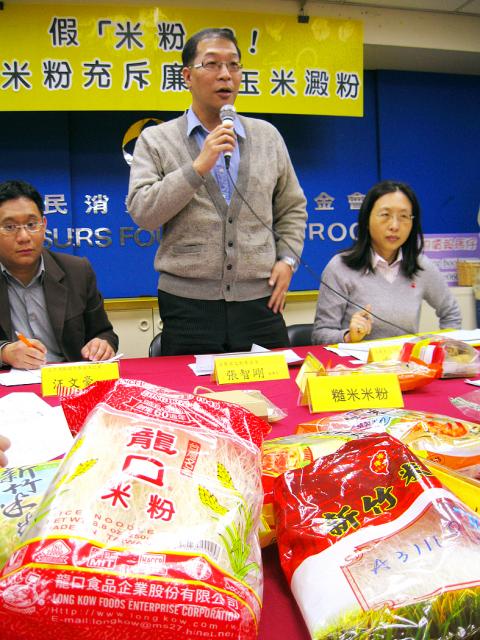Nearly 90 percent of rice vermicelli noodles are not primarily composed of their main ingredient, rice, but are instead a mix of other edible starches, the Consumers’ Foundation said yesterday.
According to the Chinese National Standard (CNS) No. 11172, there are two types of rice vermicelli: one are pure vermicelli, which are made of from rice and more than 5 percent crude protein, and the other is mixed rice vermicelli, which are more than 50 percent rice, mixed with flour or other edible starches and have more than 2.5 percent crude protein.
The foundation said a test on 52 types of rice vermicelli conducted by Internet agricultural news platform News & Market from Dec. 29 last year to Jan. 14 this year showed that 45 of the products tested (about 86.5 percent) were comprised of less than 50 percent rice, while 39 products (75 percent) were less than 20 percent rice.

Photo: Hsieh Wen-hua, Taipei Times
Citing the survey, the foundation said that LongKow noodles, a famous brand from Hsinchu, were made up of between 7 percent and 10 percent rice, despite the claim on the packages that they are 90 percent rice.
Three types of noodles from Hsinchu-based Nung-Keng claimed to meet the CNS11172 standard on their packages, but results showed that the noodles were less than 10 percent rice and contained crude protein of between 0.3 percent and 0.5 percent, it said.
Foundation chairman Mark Chang (張智剛) said that the products that do not meet the required standards should be recalled and their manufacturers fined for false labeling.
The Food and Drug Administration said companies should give accurate information about their products, as stipulated by the Act Governing Food Sanitation (食品衛生管理法), and that it would investigate the noodles sold in stores for false labeling.

Taiwan has received more than US$70 million in royalties as of the end of last year from developing the F-16V jet as countries worldwide purchase or upgrade to this popular model, government and military officials said on Saturday. Taiwan funded the development of the F-16V jet and ended up the sole investor as other countries withdrew from the program. Now the F-16V is increasingly popular and countries must pay Taiwan a percentage in royalties when they purchase new F-16V aircraft or upgrade older F-16 models. The next five years are expected to be the peak for these royalties, with Taiwan potentially earning

STAY IN YOUR LANE: As the US and Israel attack Iran, the ministry has warned China not to overstep by including Taiwanese citizens in its evacuation orders The Ministry of Foreign Affairs (MOFA) yesterday rebuked a statement by China’s embassy in Israel that it would evacuate Taiwanese holders of Chinese travel documents from Israel amid the latter’s escalating conflict with Iran. Tensions have risen across the Middle East in the wake of US and Israeli airstrikes on Iran beginning Saturday. China subsequently issued an evacuation notice for its citizens. In a news release, the Chinese embassy in Israel said holders of “Taiwan compatriot permits (台胞證)” issued to Taiwanese nationals by Chinese authorities for travel to China — could register for evacuation to Egypt. In Taipei, the ministry yesterday said Taiwan

Taiwan is awaiting official notification from the US regarding the status of the Agreement on Reciprocal Trade (ART) after the US Supreme Court ruled US President Donald Trump's global tariffs unconstitutional. Speaking to reporters before a legislative hearing today, Premier Cho Jung-tai (卓榮泰) said that Taiwan's negotiation team remains focused on ensuring that the bilateral trade deal remains intact despite the legal challenge to Trump's tariff policy. "The US has pledged to notify its trade partners once the subsequent administrative and legal processes are finalized, and that certainly includes Taiwan," Cho said when asked about opposition parties’ doubts that the ART was

If China chose to invade Taiwan tomorrow, it would only have to sever three undersea fiber-optic cable clusters to cause a data blackout, Jason Hsu (許毓仁), a senior fellow at the Hudson Institute and former Chinese Nationalist Party (KMT) legislator, told a US security panel yesterday. In a Taiwan contingency, cable disruption would be one of the earliest preinvasion actions and the signal that escalation had begun, he said, adding that Taiwan’s current cable repair capabilities are insufficient. The US-China Economic and Security Review Commission (USCC) yesterday held a hearing on US-China Competition Under the Sea, with Hsu speaking on